- Home
- David Eddings
The Elder Gods Page 34
The Elder Gods Read online
Page 34
“More trouble up there in the ravine?” Keselo asked in a tense tone of voice.
“Everything’s fine up there,” Red-Beard replied. “Our problem’s quite a bit closer—right out here in the bay, actually.”
“Sorgan Hook-Beak and the other Maags haven’t been paid yet,” Longbow explained, “and they’re not really very happy about it. We’re sort of hoping that your commander can come up with a way to pacify them.”
“Have you considered beer?” Keselo asked with a faint smile. “Lots and lots of beer.”
“Interesting notion,” Red-Beard said, “but eventually they’d sober up, and trying to argue with a Maag who has a screaming headache wouldn’t be all that much fun, I’m afraid.”
“It was just a thought,” the young Trogite said. “Come on board, gentlemen. I’ll take you back to the commander’s quarters.”
Red-Beard led the way up the ladder to the broad deck of the Trogite ship with Longbow close behind, and they followed Keselo on back toward the stern of the ship.
“Yes?” Narasan replied when Keselo politely rapped on the door. Red-Beard had noticed during the war up in the ravine that the Trogites had a tedious sort of formality about them and that very few of them had anything even remotely resembling a sense of humor.
“You have visitors, Commander,” Keselo reported.
Narasan opened the door to his rather spacious quarters. “Good evening, gentlemen,” he greeted Red-Beard and Longbow. “Is there something I can do for you?”
“Perhaps,” Longbow replied. “You and Sorgan Hook-Beak get along with each other fairly well, don’t you?”
“He doesn’t automatically reach for his sword every time he sees me,” Narasan replied. “Is he giving you trouble of some kind?”
“He’s been spending a lot of his time complaining lately,” Red-Beard said. “Zelana left here without giving him the gold she promised him, and he doesn’t like that one little bit.”
“He’s mentioned that to me a time or twelve, too,” Narasan replied with a slight smile. “Actually, it’s just about the only thing he ever discusses. He seems to believe that Lady Zelana’s trying to cheat him out of the gold she’s supposed to pay him.”
“She wouldn’t do that,” Longbow declared firmly.
“Where is she, then?”
“We don’t really know for sure,” Red-Beard admitted. “I’m just guessing here, but I don’t think she fully understood what’s involved in a war. The killing part of war seems to have disturbed her quite a bit. ‘Kill’ is just a word. Seeing it happen was probably more than she was prepared for.”
“Is she really that innocent?” Narasan asked with some surprise.
“She’s been somewhat isolated for a long time,” Longbow replied, glossing over a few realities that Red-Beard was sure Narasan wasn’t ready to accept just yet.
“We’ve got a problem, gentlemen,” Narasan said with a slightly worried frown. “Sorgan gave me his word that he’d bring his people down to the southern part of Dhrall to help me in the war that I’m getting paid to fight, but he won’t leave Lady Zelana’s Domain until she pays him. I think I’m going to need him down there, but the way things stand right now, he won’t move until he gets paid for this war.”
Longbow scratched thoughtfully at his cheek. “Why don’t you just sit here and wait, then?” he suggested.
“I didn’t quite follow you, Longbow,” Narasan admitted.
“We need somebody who can persuade Zelana to come back here and pay Sorgan, right?”
“That gets right to the bottom of things, yes.”
“Zelana’s brother needs you to go fight the war down in his Domain, doesn’t he?”
“That’s what he’s paying me for,” Narasan conceded.
“If you don’t arrive there when he expects you, he’ll most likely come here to find out what’s delaying you, won’t he?”
“Almost certainly.”
“Veltan’s probably the only one who’ll be able to persuade his sister to do what she’s supposed to do, and if we all just sit here and refuse to move, he’ll have to go find Zelana and drag her back here. Then she’ll pay Sorgan, and the Maags will celebrate a bit. Then, when they sober up, they’ll join your fleet and you can all sail south to fight Veltan’s war for him. That should just about solve all of our problems, wouldn’t you say?”
“You can be a very devious fellow when you set your mind to it, Longbow,” Narasan observed.
Longbow shrugged. “Whatever works,” he replied.
“Then all we really have to do now is practice sitting still,” Red-Beard said.
“Only after we’ve moved your tribe to their new home, friend Red-Beard,” Longbow reminded him. “We’d better go back to Lattash and see if your uncle’s come to his senses yet. If he hasn’t, we might have to rearrange a few things.”
“Is Chief White-Braid sick or something?” Narasan asked.
“I don’t know if ‘sick’ is the right word,” Red-Beard replied. “Those fire mountains have dried up the river that comes down through the ravine, and if they happen to spout out more of that melted rock, Lattash—and the whole tribe—will get cooked in the same way the snake-men did. Longbow and I found a safer place for the tribe to live, but we’ll have to get my uncle’s permission before we can start moving people, and I’m not sure that he’ll agree.”
“Is there any way that I can help?” Commander Narasan asked.
“No, thanks all the same,” Longbow said. “I think Chief Red-Beard here can take care of it.”
“Will you please stop that?” Red-Beard growled.
“Probably not,” Longbow said. “You’d better start getting used to it, my friend. I think ‘Chief Red-Beard’ is something you won’t be able to dodge much longer.”
3
One-Who-Heals was the shaman of Longbow’s tribe, and he’d always made Red-Beard a little nervous. An ordinary shaman could deal with broken bones and treat minor ailments with assorted herbal concoctions, but One-Who-Heals appeared to have a much greater knowledge than the average shaman, and he was not above a certain amount of experimentation.
Darkness had fallen over the village of Lattash when Red-Beard beached his canoe, and then he and Longbow went up through the quiet village to the lodge of Chief White-Braid. One-Who-Heals was there, and he was sitting beside the fire pit in the center of the lodge, carefully watching the sleeping chief. He touched one finger to his lips when Red-Beard and Longbow entered. “Don’t wake him,” he whispered.
“Is he sick?” Red-Beard asked quietly.
“Not exactly,” the old shaman replied. He rose to his feet. “Let’s go outside,” he suggested. “There are some things you should know.”
They all went on out of the lodge and walked a few yards away. “Your chief’s been having some problems, Red-Beard,” One-Who-Heals said gravely.
“I’ve noticed that. Can you make him well again?”
“In time, perhaps, but not immediately. Some things happened during the recent war that your chief can’t accept. The village of Lattash is a part of him—so much a part that its loss is more than he can comprehend.”
“I know. Is there any way . . . ?” Red-Beard left it up in the air.
“There’s a powerful potion—a mixture of certain roots, leaves, and a rare mushroom—that dulls the awareness and quiets the more powerful emotions. I seldom use this potion, but it seemed necessary this time. I made certain suggestions to him before he went to sleep—and several others after he dozed off. The burden of leadership will be most unpleasant for him when he awakens, and he’ll willingly hand over his authority to someone he knows that he can trust—you, most likely. He trusts you, so you’re the obvious choice.”
“You planned this all along, didn’t you, Longbow?” Red-Beard demanded accusingly. “That’s why you kept throwing ‘Chief Red-Beard’ in my teeth, wasn’t it?”
“The choice was fairly obvious, friend Red-Beard. It’s time that you grew up
anyway. You have talent, but you’ve been trying to conceal it in order to avoid responsibility. Your tribe needs you, and you can’t turn your back on that need.”
“That’s a rotten thing to say, Longbow,” Red-Beard flared. “You’re jamming duty right down my throat.”
“You might as well swallow it, my friend,” Longbow replied, “because I’ll pick it up, dust it off, and stuff it back down your throat every time you spit it out.”
“I hate you!”
“No, you don’t. You’re just a bit grouchy because your childhood’s over now and you’ve grown up. It might take you a while to get used to it, but you’ll probably do all right. If it’ll make you feel better, I can stand behind you and cuff you across the back of the head when you do something wrong.”
“What if I make mistakes?”
“Everybody makes mistakes, Chief Red-Beard,” the old shaman told him. “That’s one of the ways we learn things—not the best way, perhaps, but it’s there if you need it.”
Chief White-Braid’s lodge was a bit rickety, but it had been there for a long time. Like all the lodges in the village of Lattash, it had been built with limber willow branches interlaced with limbs taken from evergreen trees. It had originally been constructed in the shape of a dome, but it was sagging quite noticeably now, and the limber willow branches were now brittle. Red-Beard saw some correspondences there. His uncle White-Braid sagged now and then, and he also seemed quite brittle. Red-Beard sighed. The thought of getting old was very depressing.
It was quite late, and Red-Beard was tired, but he forced himself to remain awake as he sat cross-legged beside his uncle’s pallet. Chief White-Braid appeared to be sleeping soundly, so Red-Beard’s vigil didn’t really seem to make much sense, but the presence of the elders of the tribe in White-Braid’s lodge obliged him to stay awake.
His mind seemed to wander, though, and he had to keep jerking it back to the business at hand. His eyes seemed sandy, and he really wanted to get some sleep.
The vigil in his uncle’s lodge was quite peculiar. It wasn’t as if White-Braid were dying, but the elders, one by one, had come unsummoned and had quietly seated themselves in the lodge without so much as saying a word.
Red-Beard was catching a strong odor of collusion here.
Then Chief White-Braid’s eyes opened.
“Did you sleep well, uncle?” Red-Beard asked him.
“Not really, my son. No matter how much I sleep, I seem to be tired all the time now. Things here in Lattash are not as they should be, and my sleep is much troubled. I am burdened with cares now, and it seems that I am no longer able to bear those cares.” He sat up, smiling faintly. “It had been my thought that sleep might allow me to set those cares aside and return to Lattash when it was a good and pleasant place in which to live, but it has not been so. The fire mountains hover always at the edge of my mind, even when I sleep.” He sighed and shook his head.
Then he straightened, and his voice became stronger and his eyes more alert. “I think it is time for a change, my son. What is old is going away, and what is new approaches fast, and I do not like what is new. Lattash is old, and I am old. It is my thought that you should be the new, and you should find some new place for the tribe to call its home.”
Red-Beard winced. He’d been hoping that this wouldn’t happen. “Longbow and I looked at a new place yesterday, uncle,” he ventured. “It’s not as pretty as Lattash, but I think it might be safer. There’s a stream there, but it moves sluggishly, since it comes down to the bay through rounded hills rather than tumbling down out of mountains. Longbow and I saw no signs of spring floods, which isn’t a bad thing. Some years the river that comes down out of the mountains here at Lattash is just a little too frisky. It’s a nice enough river I guess, but spring excites it too much. The hunting and fishing in the place Longbow and I found should be very good, and there’s much open land for planting.”
“It would seem that you have chosen wisely, my son. In time, the memories of Lattash will fade, I think, and the new village will make the tribe content.”
“There’s much promise there, uncle,” Red-Beard replied, glossing over the stiff winds that were likely to cause a few problems. “The best thing about it is probably those rounded hills. Mountains are pretty to look at, but they seem to get excited every so often, and they start belching fire.”
“I’ve noticed that myself, my son. Mountains are young, and they sometimes feel the need to show off. Rounded hills are older, and they have more sense.” Chief White-Braid rose to his feet. “It would seem that old is not as good as it was once,” he said to the tribal elders. “It is my thought that it might be best for the tribe if we were to look to young for leadership.”
The elders all nodded gravely.
“It is good that we all agree,” Chief White-Braid declared. “I will make one last suggestion, and then I will speak no more of this matter. Red-Beard is the son of my younger brother, who died many years ago. You all may have noticed that Red-Beard laughs often and finds life most enjoyable. It is my thought that he will laugh less often if we lay the burden of leadership on him.” There was not the slightest hint of a smile on the old chief’s face.
The tribal elders, however, were all grinning broadly.
Red-Beard wasn’t amused, though. No matter which way he’d turned, Longbow had been ahead of him.
Red-Beard moved about the village of Lattash the next morning, advising the men of the tribe that he and Longbow had found a suitable location for a new village. His status in the tribe had changed, of course, but he didn’t want to strut around waving it in everybody’s face. Most of the men of the tribe seemed to be very interested when he described the place, but there were those who voiced certain objections when he admitted that the new place would not be identical to the place where the tribe now dwelt. The notion of change seems very disturbing to some men. Red-Beard patiently kept reminding them about the distinct possibility that the fire mountains would spew forth more molten rock and engulf the village and everybody in it. The ones who objected responded with maybes: “Maybe the fire mountains will go back to sleep,” or “Maybe Zelana will come back and put out the fires,” or—the most absurd of all—“Maybe a good rainstorm will blow in and put out the fire.” The dimwits seemed to feel that if they talked about something long enough, the problem would go away.
Sometimes the objectors made Red-Beard want to scream.
“I think you might be going at it the wrong way, friend Red-Beard,” Longbow suggested along about noon. “Don’t ask; tell.”
“You lost me there, Longbow.”
“You never want to ask a fool for his opinion about a decision that’s already been made, because he’ll give you his opinion, and that usually takes the rest of the day.”
“I’m just a little new at this, friend Longbow,” Red-Beard reminded him. “I’m sort of feeling my way along right now. It doesn’t seem that it’d be polite to just bull my way around, giving everybody orders.”
“It doesn’t work that way, friend Red-Beard. You don’t have time to be polite. The growing season’s already started, so the women of your tribe should be planting. If the women don’t plant, nobody will eat when winter comes.”
Red-Beard blinked. “I’d forgotten about that, I guess,” he admitted a bit sheepishly.
“Meat and fish are only a part of the food that keeps the people of the tribe alive, Red-Beard. Hunters forget that sometimes. If I happened to be the one who was doing this, I’d be talking with the women instead of the men. Never offend the ones who cook the food. If you do, you might get boiled dirt for supper.”
“I’ll have to see the meadow,” the stout middle-aged woman named Planter told Red-Beard that afternoon. Red-Beard had asked around, and almost everybody in the tribe had told him that the women of Lattash took all their problems to Planter, and she usually solved them. In an odd sort of way Planter was the actual chief of the women of the tribe, largely because she knew more about gr
owing food than anyone else.
She also had a bad temper when things didn’t go the way she wanted them to go, so Red-Beard stepped around her rather carefully. “We’ll talk with my friend Longbow,” he said. “He might have noticed some things I didn’t. I’ll be honest with you, Planter. This new place isn’t nearly as pretty as Lattash, but safe is way ahead of pretty. The tribe must move away from here, or we’ll be drinking melted rock instead of water before long.”
“You speak plainly, Red-Beard,” Planter observed. “That’s a rare thing for a chief.”
“I’m still a little new at it,” Red-Beard confessed.
“You’ll do,” Planter said a bit cryptically. “Let’s go speak with this friend of yours. If time’s as crucial as you seem to think, we’d better hurry.”
Red-Beard and Planter found Longbow in the lodge of his chief, Old-Bear, and Planter cut across the usual courtesies rather abruptly. “Has this meadow ever been worked?” she asked.
“I don’t think so,” Longbow replied. “Red-Beard and I didn’t see any signs that any tribe had ever lived there.”
“How high was the grass?”
“Waist-high or so, wasn’t it, Red-Beard?”
“At least that high,” Red-Beard agreed.
“You’d better find someplace else, then,” Planter declared.
“What’s wrong with that one?” Red-Beard asked her.
“Tall grass means thick sod,” Planter explained, “and we’ll have to clear the sod away before we can plant. That’ll take too long. Summer’s almost here, and we should have planted already. If the women of the tribe have to spend half the summer clearing the sod away before they plant, the crop won’t have time enough to grow before the first frost, and there won’t be anything to eat this coming winter.”
Old-Bear squinted at her thoughtfully. “It is my thought that we should find some way around certain traditions,” he said gravely. “If the tribe of White-Braid is to have food to eat after the seasons turn, we will need many hands to remove the sod so that the women of the tribe can plant.”

 The Losers
The Losers The Ruby Knight
The Ruby Knight The Sapphire Rose
The Sapphire Rose King of the Murgos
King of the Murgos The Seeress of Kell
The Seeress of Kell Demon Lord of Karanda
Demon Lord of Karanda Pawn of Prophecy
Pawn of Prophecy Queen of Sorcery
Queen of Sorcery Castle of Wizardry
Castle of Wizardry Guardians of the West
Guardians of the West Sorceress of Darshiva
Sorceress of Darshiva The Shining Ones
The Shining Ones Enchanters' End Game
Enchanters' End Game Magician's Gambit
Magician's Gambit High Hunt
High Hunt The Hidden City
The Hidden City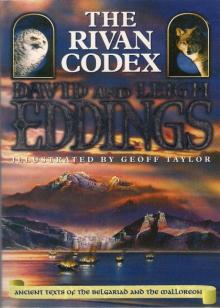 The Rivan Codex
The Rivan Codex Regina's Song
Regina's Song The Elder Gods
The Elder Gods The Malloreon: Book 02 - King of the Murgos
The Malloreon: Book 02 - King of the Murgos The Malloreon: Book 05 - Seeress of Kell
The Malloreon: Book 05 - Seeress of Kell Treasured One
Treasured One The Malloreon: Book 04 - Sorceress of Darshiva
The Malloreon: Book 04 - Sorceress of Darshiva The Malloreon: Book 03 - Demon Lord Of Karanda
The Malloreon: Book 03 - Demon Lord Of Karanda Belgarath the Sorcerer and Polgara the Sorceress
Belgarath the Sorcerer and Polgara the Sorceress The Malloreon: Book 01 - Guardians of the West
The Malloreon: Book 01 - Guardians of the West The Treasured One
The Treasured One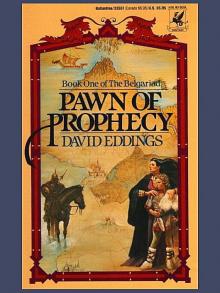 Pawn of Prophecy tb-1
Pawn of Prophecy tb-1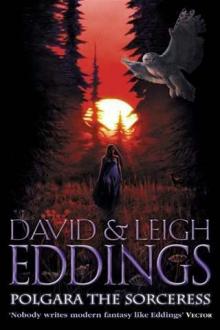 Polgara the Sorceress
Polgara the Sorceress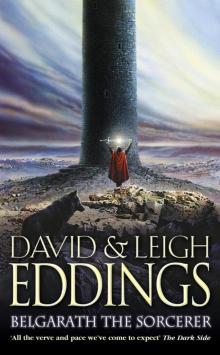 Belgarath the Sorcerer
Belgarath the Sorcerer The Younger Gods
The Younger Gods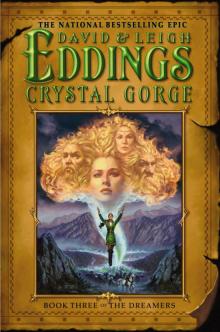 Crystal Gorge
Crystal Gorge